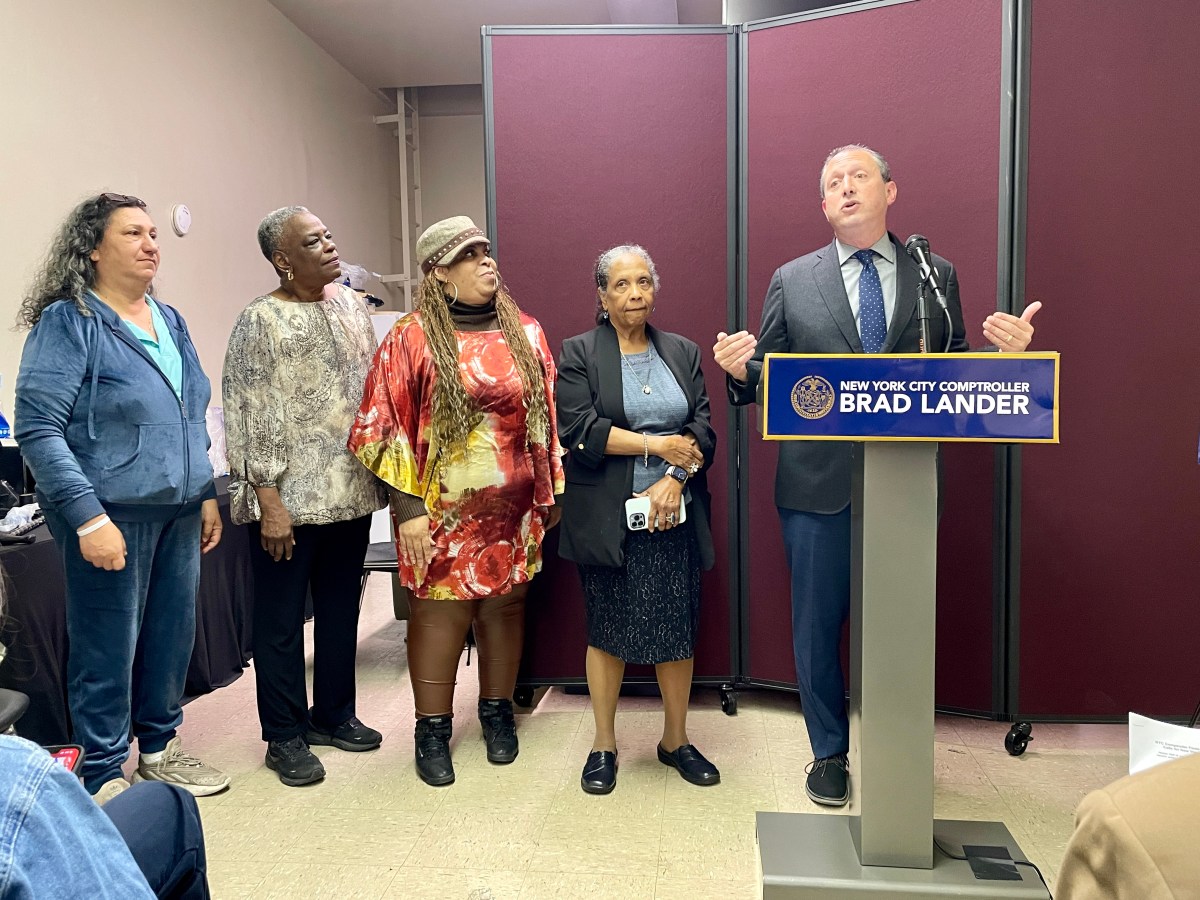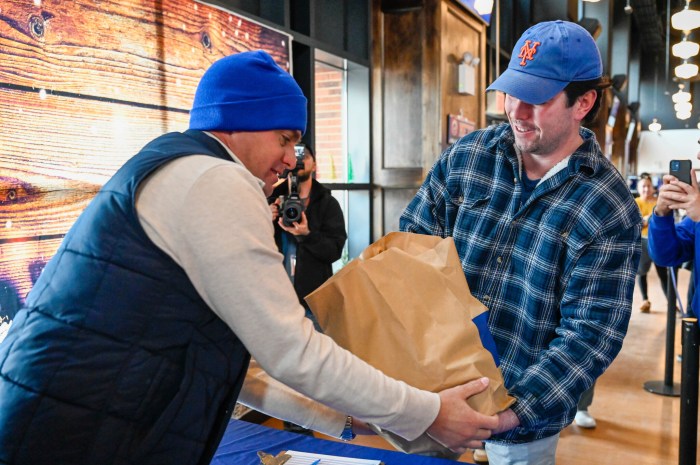
New York City is home to thousands of businesses, but as larger companies move into low-income communities, black-owned businesses have suffered.
Business boomed from 2007 to 2012, with the number of minority-owned businesses rising in every borough, according to a 2017 report released by Comptroller Scott Stringer. But black-owned businesses did not share in the wealth — they made up just 3 percent of the city’s business base in 2012, dropping from just 5 percent overall in 2007. In the Bronx alone, the number of black-owned firms dropped by 7 percent.
Despite the decline, black entrepreneurs are doing everything they can to keep their businesses thriving. One woman is using her culinary skills to bring a healthier lifestyle to Bronx residents, a Bed-Stuy couple is expanding their bed-and-breakfast empire, and many more are giving back to their communities as they fight the negative effects of gentrification.
Meet the New Yorkers who are paving the way for the growth of black-owned businesses:
As a 35-year-old mom of two small children, Emijaa Jaaemil knows what it means to have a packed schedule. Along with working full-time as a software trainer at a law firm, she also runs her own headwear and accessory company out of her apartment in Prospect Heights.
“I’ve always been the creative type,” Jaaemil said. “I can get inspired by anything. I can just look at a pair of shoes and instantly my mind just starts going with what I can create to pair with it.”
Despite the stress and exhaustion from running her own business, she said every minute of it is worth it. Unlike larger businesses that sell similar products, Jaaemil aims for higher quality fabrics, patterns and styles that are unique to her customers’ preferences. After just a few years of working in the industry, her headwear will be featured in a fashion show on Feb. 9 as part of Small Boutique Fashion Week.
“A lot of people feel like they can’t wear a turban. Yes, you can,” she said. “It’s going to be a modern turban with modern fabrics and modern style. I’m going to show you how to incorporate it where you’re able to wear it dressed up or you can wear it dressed down or lounging.”
Jaaemil said the way to make sure black-owned businesses succeed is for owners to put customers first and be willing to grow with technology.
“You have to make sure that you’re going to keep up with your competitors. If they’re following and going along with technology, customers are of course going to go with the place that’s easier to work with,” she added.
Jaaemil said she creates pieces to fit the styles of everyone who contributes to the transcending dynamic of Brooklyn, regardless of their race or age, and hopes that it will help her business grow as she looks to turn it into a full-time career with a storefront.
In an industry dominated by white men, the co-owners of Harlem Hops are using their new craft beer bar to elevate and celebrate their peers.
Kim Harris, Stacey Lee and Kevin Bradford opened Harlem’s first black-owned craft beer bar in 2018, but don’t be fooled by their relative newness to the New York City restaurant scene.
The trio has helped carve a niche in the market with their focus on including black-owned businesses in their carefully curated selection of small batch beers, spirits and food. Their selection of Spicy Guma Pies on the menu, for example, are made by a company run by a Ugandan refugee.
"We’re adamant in supporting minority-owned businesses and women-owned businesses,” Bradford said. “There are small brewers that are doing 20 to 30 kegs a batch, and we have to support those guys. They’re local and it’s fresh.”
Part of the inspiration for opening the bar in Harlem was born out of the idea that the group wanted to make sure young people of color could see themselves reflected in the craft beer industry.
“We’re all about community and we really wanted to come back into the community where gentrification is taking place,” Lee said. “It was important for us to be in an area where our community would accept us and also to show our younger generation, being a person of color, that you can be an entrepreneur, you can be educated, you can own multiple businesses.”
It’s also why they decided to offer a scholarship to a graduating senior attending a historically black college or university (HBCU).
“All of us attended HBCUs and for Kim and I, our motto was ‘I’ll find a way or make one,’ so that’s what we stood on throughout the entire process of opening Harlem Hops,” Lee said.
While opening any business has its obstacles, the fact that each co-owner brings a different expertise to the table has worked in their favor.
“We all work very well together and when things would arise, there was always one of us who could handle it and take it on. I would not have wanted to do this with any two other people,” Lee said. “The outpouring of love that we’ve received has just been amazing, so any struggles that we may have had have been overshadowed by the community love that we’ve gotten."
To Monique Greenwood and her husband, Glenn Pogue, 60, one of the best investments anyone can make is in real estate. When they realized 24 years ago that Brooklyn was lacking a major place for visitors to stay, they decided to turn a dilapidated mansion from the 1860s into a bed-and-breakfast.
That one investment in Bed-Stuy turned into the purchase of several lots around the mansion and eventually, an enterprise. The couple now owns four other bed-and-breakfasts in Washington, D.C., Philadelphia, the Poconos and Cape May, New Jersey.
“We purchased a block down the street and that’s where we opened our restaurant and our daughter opened a coffee shop . . . Our best friends opened a book store and an antique shop,” Greenwood, 59, said. “We had this kind of main street in the middle of urban America and that complimented the bed-and-breakfast experience but it also kind of proved to people in the neighborhood that we could be self-sufficient and own businesses that would support our living.”
Their Brooklyn mansion includes four rooms, wireless internet, a library, secluded garden and sun porch, and offers a Southern-style breakfast and refreshments for guests. Greenwood and her husband are self-proclaimed “boot-strappers” and believe these amenities, as well as their passion for ensuring guests have a unique and homey experience during their visits, allow their business to thrive despite gentrification in the area. Many black-owned businesses, she admitted, are not so lucky.
“For black businesses in particular, they may not have the cushion of a second person in the home with an outside job. They may not have the family connections that will bankroll their startup and helm them through the lean times,” she said. “But certainly, I don’t think any of it is due to the lack of desire or effort.”
No matter what changes happen in Brooklyn, demographically or economically, Greenwood said the key to Akwaaba’s success is staying true to who they are.
Jaynine Taylor has turned her passion for baking into a mission to bring a healthier lifestyle to Bronx residents. The 48-year-old East Bronx resident started Taylor Made Creations for All Occasions Inc. after realizing her true passion was not for sociology, the subject she went to college for, but for baking.
“I always wanted to push the envelope on doing different things,” she said of her passion for sweets. “I love trying new recipes.”
Many of those recipes include healthier ingredients, including agave nectar, applesauce and egg replacement. Her chocolate chip cookies are made with almond milk and without eggs, and she bakes her brownies with black beans from the local farmers market.
“Living in the Bronx, we have the highest rate of diabetes, high blood pressure and a lot of health problems in all of New York State,” she said of her business motto "Baking a difference in the Bronx."
"So I said if I can make a baked good that looks good and tastes good and is healthy, it’s a winner.”
Taylor has come a long way since putting the wrong-sized chocolate chips in her first cake 38 years ago. After partaking in Hot Bread Kitchen’s culinary training, a program that teaches women culinary skills and connects them to local employment opportunities, Taylor wanted to use her new abilities to give back. She completed the New York City Housing Authority’s Food Business Pathways Program and now runs her bakery service out of Hot Bread’s incubator kitchen, which she said has help her business grow tremendously.
When Jyll Hubbard-Salk began taking yoga classes in the city 30 years ago, she was often the only woman of color in the room. But the lack of diversity was not enough to scare off the “6-foot Amazon black woman” from what she instantly knew was her life’s passion.
“The first yoga class I took, it felt like home,” Hubbard-Salk, 52, said.
As yoga’s popularity exploded, and Hubbard-Salk transformed from student to teacher, she said she would often hear from people of color in her classes who had horrible experiences at other studios.
“People were saying that when they would go to yoga studios the teachers were rude or they didn’t feel welcome,” she recalled. “One of my friends went to a studio in midtown and the teacher was like, ‘oh you can’t do that pose because your butt’s too big.’”
It was stories like these, Hubbard-Salk said, that inspired her to open her own studio right in the heart of Crown Heights. Opened in 2012, Urban Asanas offers a welcoming and inclusive environment for yoga, Pilates and meditation classes.
“I love what I do,” Hubbard-Salk said. “I tell people to come to the studio, and you leave all your problems — your blood, your sweat, your tears — on the mat and I’m going to take them for you.”
In addition to offering a free class once a month — something Hubbard-Salk believes more studios should offer — Urban Asanas has partnered with Just Soul catering to provide yoga classes to formerly incarcerated women.
As rents continue to rise, endangering small businesses across the city, Hubbard-Salk’s studio is thriving. She’s gearing up to launch an expansion of her business: a wellness center that will offer acupuncture services, massage and an infrared sauna.
Hubbard-Salk attributed some of her success to her strong ties to the community. An 18-year resident of Crown Heights (her apartment is just a block away from the studio), she has cultivated relationships with her neighbors and said the landlord of her studio understands the positive impact her practice has on the community.





























